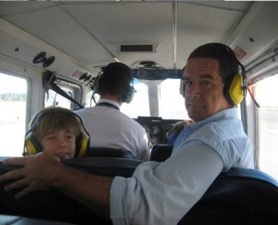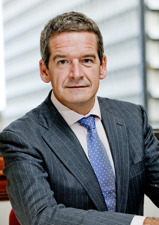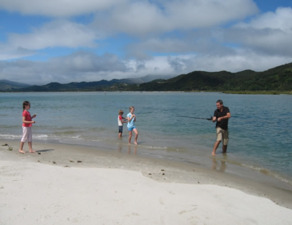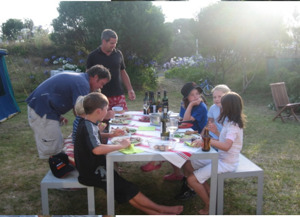At 45 Harte is the poster boy for bank transformations worldwide, and while he acknowledges that sort of salary ($3 million plus by the time you add in super and bonus payments) seems like an awful lot of money for a bloke from Palmerston North, it can be reconciled because he and his operations and technology teams are delivering significant value to the bank's customers and shareholders.
'In many ways it's an obscene amount of money, way more money than I would ever have hoped to have earned as a child, but the magnitude of responsibility and the daily challenge as well as the ongoing need to stay well ahead of the competition and to lead in the industry requires a level of recognition.
'You have to be confident enough that you can meet the needs of shareholders. They want you to lead and stay ahead of competition and drive competitive advantage - and want to be the leader in delivery of the best services of anyone in the industry - simple, fast, convenient and for those services to be loved by your customers.
'And most powerful of all is sustaining the motivation and excitement of your staff who have to turn up every day and do the very best they can and feel they are making a difference because that's the competitive advantage. If you read all the literature from Harvard or MIT, competitive advantage is driven by assets you create and maintain that are sustainably differentiated from your competition and you can put a price on that stuff.
'But the thing that differentiates you over the long term is making sure staff are committed to what they do, believe in what they do, are super motivated and excited so that they do their very best, and that's the hardest thing to do - you get rewarded for that,' says Harte who has the official title Group Executive, Enterprise Services and Chief Information Officer.
IT wasn't where he planned to make his mark though. Like many other boys in the 1960s Harte wanted to be an astronaut, only to be crushed when he learned New Zealand didn't have a space programme.
The seventh in a family of nine children, Harte was born in Palmerston North in New Zealand. His father was a primary school teacher, his mother a trained nurse - and young Michael was 'a bit naughty' with tendencies which nudged toward the misfit in his high school years.
|
|
How much of a bad boy Harte really was is probably only known by his parents and the local constabulary. Today he seems more establishment than outcast, having climbed to become a respected member of the Commonwealth Bank's C-suite along with the chairman of the bank's art committee, and a serial funder of IT related charities and enterprises aimed at bridging the digital divide.
His route to the C-suite however hasn't been conventional.
 After a youthful dalliance with the notion of becoming a landscape gardener, Harte started an undergraduate course at Massey University where he completed a singularly undistinguished first year, by passing only one course - business law. Harte's bigger interest was partying and playing rugby. Today 92 kilos sits sparely on his 6'3' frame - in the 1980s though he weighed in at a meatier 110 kilos, making him useful at lock in the Marist club side. 'There is no greater joy as a teenager than scoring tries. It was that simple aspiration that led me to a better path than petty arson and vandalism,' he quips.
After a youthful dalliance with the notion of becoming a landscape gardener, Harte started an undergraduate course at Massey University where he completed a singularly undistinguished first year, by passing only one course - business law. Harte's bigger interest was partying and playing rugby. Today 92 kilos sits sparely on his 6'3' frame - in the 1980s though he weighed in at a meatier 110 kilos, making him useful at lock in the Marist club side. 'There is no greater joy as a teenager than scoring tries. It was that simple aspiration that led me to a better path than petty arson and vandalism,' he quips.Although he eventually knuckled down and graduated with a business degree, he remained 'directionless' and IT was never entertained seriously as a career despite some university flirtation with Fortran, Cobol and punchcards.
After early jobs in the NZ Ministry of Commerce and then dairy company Fonterra his breakthrough came when he secured a role as an international trade advisor to the NZ Dairy Board. 'I was lucky to get that job - I'd been pretty lousy at every job I'd tried before.'
For six years Harte worked closely with the Board's chairman and the CEO; 'In the thick of the Uruguay round of the GATT - my job was to secure the dairy industry better terms of trade through renegotiating international commodity trading rules. That's when I got interested in how business and Government worked together; how corporations needed to make good capital allocation decisions; and how it's important that business and information rules create competitive advantages.'
|
Harte was undergoing that transition most of us eventually face known as 'emerging from your 20s'.
Sponsored by the Dairy Board to do some further studies and research in London, Harte also came face to face with Mammon. 'London was expensive place to live and having 8,000 pounds in my pocket was insufficient when my peers were earning that in a week or a month in really easy jobs.'
It was then that Harte got his first job in IT - and realised a career with computers could be lucrative - as a contractor at Citibank, which quickly took him on permanently. Although he had no IT skills whatsoever he was hired as a business analyst and project manager.
 He argues that what he lacked in IT skills and experience he made up for in common sense, drive, dedication, application and problem solving. 'If you deliver good results and do it well with lots of people then most organisations will offer you more and more responsibility - that's how you get experience.
He argues that what he lacked in IT skills and experience he made up for in common sense, drive, dedication, application and problem solving. 'If you deliver good results and do it well with lots of people then most organisations will offer you more and more responsibility - that's how you get experience.'It's probably called a mixture of a little moxie and a bit of balls. New Zealand breeds a lot of people like that - independent free thinking analytical with common sense - ready to try anything and give it a go - and there are a lot of similarities with young people in Australia.'
Harte's moxie also had him casting his eyes toward the C-suite while at Citibank. Why? 'There's a lot of self-esteem and actualisation from doing responsible jobs and making big decisions running and leading corporations - I wanted part of that action and to be well remunerated for it.'
|
'I knew I wasn't going to be in product and I wasn't going to be marketing and I wasn't going to be finance so if I wanted to get into the C-suite it wasn't through those traditional career paths.
'I looked at IT. IT organisations didn't have the confidence to have conversations with business and make decisions with them so the business analyst straddled between the business and IT, and I thought it wouldn't be that bad to be a CIO. It was the fastest and easiest route up the jungle gyms to get to the C-suite.
'However I lacked the detailed systems knowledge and believed I could not rely on just raw experience alone to fully sustain an IT career at the head of the pack. I decided to go back to school while working full time and was lucky to be funded by Citi to go to NYU to complete a Master of Science in Systems. I was determined this time not to fritter away the opportunity of a world class education. I was determined to get straight As and graduate with honours.
'I loved learning in in a city as exciting as New York and the new internet boom was just getting underway - even being awake at 3AM working every day for two years was exhilarating. My eyes were opened to new ideas. This lead to a deep relationship with MIT that has lasted 12 years and still involves research and venturing opportunities.'
 Harte visits MIT every year for an injection of ideas and energy. 'Citi was a wonderful place to be. They gave me opportunities to work with The Santa Fe Institute, Stanford Research Institute and University of Michigan - this was as exciting as being an astronaut.'
Harte visits MIT every year for an injection of ideas and energy. 'Citi was a wonderful place to be. They gave me opportunities to work with The Santa Fe Institute, Stanford Research Institute and University of Michigan - this was as exciting as being an astronaut.'Having survived September 11th during his years with Citibank in New York, Harte worked in a series of senior roles eventually becoming vice president of IT in operations and technology, working in the CIO office on corporate, liquidity, risk management and HR systems. But the jungle drums let him know he wasn't going to be made Citigroup's CIO any time soon.
Instead, 'I found this bank no one had heard of but owned subsidiaries that did services for other banks.' PNC Financial Services gave Harte his first CIO role where he found himself delivering information systems, business processing and application services (read pre cloud era cloud services) for hedge funds, mutual funds and pension funds.
|
By 2006 Harte and his family were ready to move on. 'I had offers from Visa, I was even toying with the opportunities as CIO for the IMF or the Gates Foundation. They were super jobs and perhaps when I'm in my 60s I will be able to give more'¦but I had mortgages and three children and an addiction to material things that needed to be paid for.'
That led him to the Commonwealth Bank in 2006. 'I turned up at 44 Martin Place, no one had heard of me - there were no executives because the board were meeting in Perth. It took me three shots to find my office, I didn't know what building - but I found my cubicle in 175 Pitt St.
 'The job was 'make IT a group wide function because it was fragmented silos, lever the good things, save $300 million, get smarter sourcing from suppliers and bring some process excellence to the customer experience'. Fix it, shape it up and get some excitement into the organisation.
'The job was 'make IT a group wide function because it was fragmented silos, lever the good things, save $300 million, get smarter sourcing from suppliers and bring some process excellence to the customer experience'. Fix it, shape it up and get some excitement into the organisation.'The biggest surprise was that of the 3,800 people in IT, 20 per cent were actively disengaged and had been for years. That was the hardest thing to reconcile and shake.' Harte worked on his team, put hundreds of them through training programmes, including one specially developed by MIT, and over time re-engaged them.
Beyond that he adopted the MIT philosophy that to succeed; 'There's only two things you have to do - have the best platforms and have really good people that make the right decisions fast on a more frequent basis that deploy reliably and repeatably. It took us five years to come from way at the back of the pack with 20 per cent of our people disengaged - to being clearly in front of the pack and the morale and customer engagement is equal to and better than the corporation's mean.'
|
'Many big global banks are currently on their knees and they are looking for ways to save money rather than make money and after this recovery phase they will be ready to reinvest. We took a market opportunity to invest in some very significant game changing technologies which are yet to fully deliver and I'm committed to achieve that, it will take a minimum of two more years to complete everything we have set out to do to be number one.
 'I am obliged to do that and I think that then we can claim we have delivered three game changing investments and differentiated this organisation from all others around the world as a result. You don't get the right to get a promotion or new placement unless you can prove you have delivered.
'I am obliged to do that and I think that then we can claim we have delivered three game changing investments and differentiated this organisation from all others around the world as a result. You don't get the right to get a promotion or new placement unless you can prove you have delivered.'We made some big promises three or four years ago and we are still in the process of delivering those - the delivery of finest on line and other new platform capabilities have proven our execution ability. Core banking has got a year or so to run - it's the first of its kind in the world and we are going to deliver a new finance and risk architecture and deliver a new core trading system in the institutional bank.
'We have now set up the foundations that will put us in great stead for the next ten years at least.'
Then what?
'I'm personally committed to the staff, customers and shareholders of CBA for at least three more years and if they still want me around after the big things have been delivered I'll stick around if I am driving value because I will still be motivated. I am grateful for all the wonderful opportunities people have given me and I never want to let them down. But that said I think I've got one more big transformational change somewhere in the world before I'm 55 then I can be the gardener I have always dreamed of being. '


 Michael Harte earns a little over $8,000 a day in return for running the systems and operations of the Commonwealth Bank. His mother thinks it's a disgraceful amount of money.
Michael Harte earns a little over $8,000 a day in return for running the systems and operations of the Commonwealth Bank. His mother thinks it's a disgraceful amount of money. 


